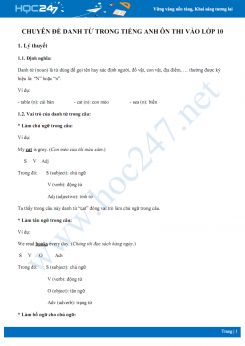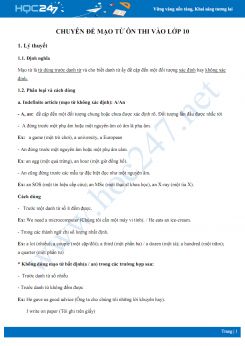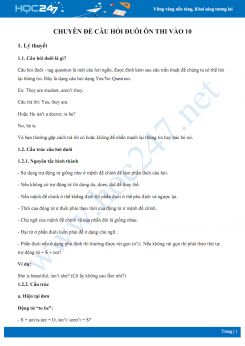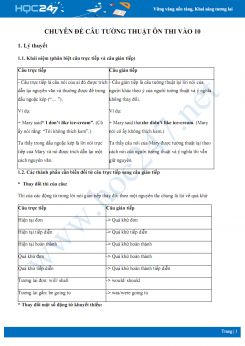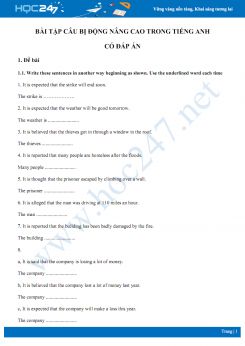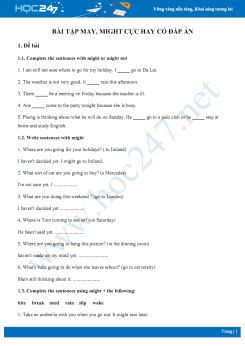Hoc247 xin giới thiệu đến các em tài liệu Chuyên đề mệnh đề quan hệ ôn thi vào 10 nhằm giúp các em luyện tập và chuẩn bị cho kì thi tuyển sinh vào lớp 10 sắp tới. Hi vọng đây sẽ là tài liệu tham khảo hữu ích trong quá trình học tập của các em. Mời các em cùng tham khảo nhé!
CHUYÊN ĐỀ MỆNH ĐỀ QUAN HỆ ÔN THI VÀO 10
1. Lý thuyết
1.1. Mệnh đề quan hệ là gì?
Mệnh đề (Clause) là một phần của câu, nó có thể bao gồm nhiều từ hay có cấu trúc của cả một câu. Mệnh đề quan hệ dùng để giải thích rõ hơn về danh từ đứng trước nó.
Xét ví dụ 1: The woman who is wearing the T-shirt is my girl friend.
Trong câu này phần được viết chữ nghiêng được gọi là một relative clause, nó đứng sau “the woman” và dùng để xác định danh từ đó. Nếu bỏ mệnh đề này ra chúng ta vẫn có một câu hoàn chỉnh: The woman is my girlfriend.
Xét ví dụ 2: The girl is Nam's girlfriend. She is sitting next to me. =>The girl who is sitting next to me is Nam's girl friend.
Mệnh đề quan hệ thường được nối với mệnh đề chính bằng các đại từ quan hệ (relative pronouns): who, whom, which, whose, that......
Mệnh đề quan hệ có hai loại: mệnh đề quan hệ xác định và mệnh đề quan hệ không xác định
a. Mệnh đề xác định (Defining relative clauses)
- Là mệnh đề được dùng để xác định danh từ đứng trước nó,cần thiết cho ý nghĩa của câu; không có nó câu sẽ không đủ nghĩa. Tất cả các đại từ quan hệ được sử dụng trong mệnh đề xác định.
Ví dụ:
Do you know the name of the man who came here yesterday?
The man (whom / that) you met yesterday is coming to my house for dinner.
➨ Mệnh đề xác định không có dấu phẩy
b. Mệnh đề không xác định (Non – defining clauses)
- Là mệnh đề cung cấp thêm thông tin về người hoặc vật, không có nó thì câu vẫn đủ nghĩa.
Ví dụ: Miss Hoa, who taught me English, has just got married.
➨ Mệnh đề không xác định có dấu phẩy và Mệnh đề này không được dùng “That”
1.2. Đại từ quan hệ (Relative Pronouns)
a. WHO:
- Làm chủ từ trong mệnh đề quan hệ
- Thay thế cho danh từ chỉ người
….. N (person) + WHO + V + O
Ví dụ: The woman who lives next door is a doctor.
b. WHOM:
- làm túc từ cho động từ trong mệnh đề quan hệ
- thay thế cho danh từ chỉ người
…..N (person) + WHOM + S + V
Ví dụ: George is a person whom I admire very much
c. WHICH:
- làm chủ từ hoặc túc từ trong mệnh đề quan hệ
- thay thế cho danh từ chỉ vật
….N (thing) + WHICH + V + O
….N (thing) + WHICH + S + V
The machine which broke down is working again now
d. THAT:
Mệnh đề quan hệ xác định:
Là mệnh đề cần phải có trong câu, nếu bỏ đi mệnh đề chính sẽ không có nghĩa rõ ràng. Đối với loại câu này, đại từ quan hệ làm tân ngữ có thể được bỏ đi. Ta có thể dùng từ that thay thế cho who, whom, which...
Mệnh đề quan hệ không xác định:
Trước và sau mệnh đề này phải có dấu (,). Trường hợp này ta KHÔNG ĐƯỢC dùng từ “that” thay thế cho who, whom, which và không được bỏ đại từ quan hệ trong mệnh đề này.
Ví dụ 1: My father is a doctor. He is fifty years old ➨ My father, who is fifty years old, is a doctor.
Ví dụ 2: Mr Brown is a very nice teacher. We studied English with him. ➨ Mr Brown, who(m) we studied English with, is a very nice teacher.
Trường hợp bắt buộc dùng that và không được dùng that:
Trường hợp phải dùng that: sau một danh từ hỗn hợp (vừa chỉ người, vừa chỉ vật hoặc đồ vật). Ví dụ: We can see a lot of people and cattle that are going to the field
- Sau đại từ bất định:
Ex: I’ll tell you something that is very interesting.
- Sau các tính từ so sánh nhất, ALL, EVERY, VERY, ONLY:
Ex: This is the most beautiful dress that I have.
All that is mine is yours.
You are the only person that can help us.
- Trong cấu trúc It + be + … + that … (chính là …)
Ex: It is my friend that wrote this sentence. (Chính là bạn tôi đã viết câu này.)
Trường hợp không dùng that: mệnh đề có dấu (,), ĐTQH có giới từ đứng trước.
Lưu ý: giới từ chỉ đứng trước whom và which, không đứng trước who và that
Ví dụ: Peter, who/whom I played tennis with on Sunday, was fitter than me.
Or: Peter, with whom I played tennis on Sunday, was fitter than me.
Not: Peter, with who I played tennis on Sunday, was fitter than me.
e. WHOSE:
Đại từ dùng để chỉ sở hữu cho danh từ chỉ người hoặc vật, thường thay cho các từ: her, his, their, hoặc hình thức ‘s
…..N (person, thing) + WHOSE + N + V ….
Ví dụ: I met someone whose brother I went to school with
1.3. Trạng từ quan hệ (Relative Adverb)
Trạng từ quan hệ có thể được sử dụng thay cho một đại từ quan hệ và giới từ. Cách làm này sẽ làm cho câu dễ hiểu hơn.
Ví dụ: This is the shop in which I bought my bike. ➨ This is the shop where I bought my bike.
a. WHY:
Trạng từ quan hệ why mở đầu cho mệnh đề quan hệ chỉ lý do, thường thay cho cụm for the reason, for that reason.
…..N (reason) + WHY + S + V …
Ví dụ 1: I don’t know the reason. You didn’t go to school for that reason. → I don’t know the reason why you didn’t go to school.
Ví dụ 2: I don't know the reason. You didn't go to school for that reason. =>I don't know the reason why you didn't go to school.
b. WHERE:
Trạng từ quan hệ để thay thế cho các từ/cụm từ chỉ địa điểm, nơi chốn.
….N (place) + WHERE + S + V …. (WHERE = ON / IN / AT + WHICH)
Ví dụ 1: a/ The hotel wasn’t very clean. We stayed t that hotel. → The hotel where we stayed wasn’t very clean.
Ví dụ 2: This is my hometown. I was born and grew up here. => This is my hometown where I was born and grew up.
Ví dụ 3: The restaurant where we had Lunch was near the airport.
c. WHEN:
Là trạng từ quan hệ để thay thế cho cụm từ/từ chỉ thời gian.
….N (time) + WHEN + S + V … (WHEN = ON / IN / AT + WHICH)
Ví dụ 1: Do you still remember the day? We first met on that day.
➨ Do you still remember the day when we first met?
➨ Do you still remember the day on which we first met?
Ví dụ 2: I don’t know the time. She will come back then. ➨ I don’t know the time when she will come back.
That was the day. I met my wife on this day. ➨That was the day when I met my wife.
1.4. Lưu ý cần nhớ trong mệnh đề quan hệ
a. Nếu trong mệnh đề quan hệ có giới từ thì giới từ có thể đặt trước hoặc sau mệnh đề quan hệ (chỉ áp dụng với whom và which.)
Ví dụ: Mr. Brown is a nice teacher. We studied with him last year.
➨ Mr. Brown, with whom we studied last year, is a nice teacher.
➨ Mr. Brown, whom we studied with last year, is a nice teacher.
b. Có thể dùng which thay cho cả mệnh đề đứng trước.
Ví dụ: She can’t come to my birthday party. That makes me sad. → She can’t come to my birthday party, which makes me sad.
c. Ở vị trí túc từ, whom có thể được thay bằng who.
Ví dụ: I’d like to talk to the man whom / who I met at your birthday party.
d. Trong mệnh đề quan hệ xác định , chúng ta có thể bỏ các đại từ quan hệ làm túc từ:whom, which.
Ví dụ: The girl you met yesterday is my close friend. The book you lent me was very interesting.
e. Các cụm từ chỉ số lượng some of, both of, all of, neither of, many of, none of … có thể được dùng trước whom, which và whose.
Ví dụ 1: I have two sisters, both of whom are students. She tried on three dresses, none of which fitted her.
Ví dụ 2: Daisy has three brothers. All of them are teachers. ---> Daisy has three brothers, all of whom are teachers.
Ví dụ 3: He asked me a lot of questions. I couldn’t answer most of them. ---> He asked me a lot of questions, most of which I couldn’t answer.
f. KHÔNG dùng THAT, WHO sau giới từ.
Ví dụ: The house in that I was born is for sale.
2. Bài tập
2.1. In some of these sentences you need who or that. Correct the sentences where necessary.
|
1 |
The woman lives next door is a doctor. |
The woman who lives |
|
2 |
Have you found the keys you lost? |
OK |
|
3 |
The people we met last night were very nice. |
............... |
|
4 |
The people work in the office are very nice. |
............... |
|
5 |
The people I work with are very nice. |
............... |
|
6 |
What have you done with the money I gave you? |
............... |
|
7 |
What happened to the money was on the table? |
............... |
|
8 |
What's the worst film you've ever seen? |
............... |
|
9 |
What's the best thing it has ever happened to you? |
............... |
2.2. What do you say in these situations? Comple each sentence with a relative clause?
1. Your friend lost some keys. You want to know if he has found them. You say:
Have you found the keys you lost?
2. A friend is wearing a dress. You like it. You tell her:
I like the dress ..................... .
3. A friend is going to see a film. You want to know the name of the film. You say:
What's the name of the film .....................?
4. You wanted to visit a museum. It was shut when you got there. You tell a friend:
The museum .......... was shut when we got there.
5. You invited some people to your party. Some of them couldn't come. You tell someone:
Some of the people .......... couldn't come.
6. Your friend had to do some work. You want to know if she has finished. You say:
Have you finished the work .......... ?
7. You hired a car. It broke down after a few miles. You tell a friend:
The car .......... broke down after a few miles.
8. You stayed at a hotel. Tom had recommended it to you. You tell a friend:
We stayed at a hotel .......... .
2.3. Complete each sentence using a relative clause with a preposition. Choose from the box:
|
We went to a party last night |
You can rely on Gary |
|
I work with some people |
We were invited to a wedding |
|
You were looking for some books |
You told me about a hotel |
|
I applied for a job |
I saw you with a man |
1. Are these the books you were looking for?
2. Unfortunately we couldn't go to the wedding .... .
3. I enjoy my job. I like the people .... .
4. What's the name of that hotel .... ?
5. The party .... wasn't very enjoyable.
6. I didn't get the job .... .
7. Gary is a good person to know. He's somebody .... .
8. Who was that man .... in the restaurant?
2.4. Put in that or what where necessary. If the sentence is already complete, leave the space empty.
1. I gave her all the money ..–.. I had. (all the money that I had is also correct)
2. Did you hear what they said?
3. They give their children everything .... they want.
4. Tell me .... yo want and I'll try to get it for you.
5. Why do you blame me for everything .... goes wrong?
6. I won't be able to do much, but I'll do .... I can.
7. I won't be able to do much but I'll do the best .... I can.
8. I don't agree with .... you've just said.
9. I don't trust him. I don't believe anything .... he says.
2.5. You meet these people (A, B, C, D, E, F & G) at a party:
1. A: My mother writes detective stories.
2. B: My wife is an English teacher.
3. C: I own a restaurant.
4. D: My ambition is to climb Everest.
5. E & F: We've just got married.
6. G: My parents used to work in a circus.
The next day you tell a friend about these people. Complete the sentences using Who or Whose.
1. I met somebody whose mother writes detective stories.
2. I met a man .........................................
3. I met a woman .......................................
4. I met somebody ......................................
5. I met a couple ......................................
6. I met somebody ......................................
2.6. Complete each sentence using who/whom/whose/where.
1. What's the name of the man whose car you borrowed?
2. A cemetery is a place .... people are buried.
3. A pacifist is a person .... believes that all wars are wrong.
4. An orphan is a child .... parents are dead.
5. What was the name of the person to .... you spoke on the phone?
6. The place .... we spent our holidays was really beautiful.
7. This school is only for children .... first language is not English.
8. The woman with .... he fell in love left him after a month.
2.7. Write the relative clauses in a more formal way using a preposition + whom/which.
1. Yesterday we visited the City Museum, which I'd never been to before.
Yesterday we visited the City Museum, to which I'd never been before.
2. My brother showed us his new car, which he's very proud of.
My brother showed us his new car .....................
3. This is a photograph of our friends Chris and Sam, who went on holiday with.
This is a photograph of our friends Chris and Sam, ................
4. The wedding, which only members of the family were invited to, took place on Friday.
The wedding, ..................., took place on Friday.
2.8. Use the information in the first sentence to complete the second sentence. Use all of/ most of ... or the .... of + whom/which.
1. All of Mary's brothers are married.
Mary has three brothers, all of whom are married.
2. Most of the information we were given was useless.
We were given a lot of information, .................. .
3. Jane has received neither of the letters I sent her.
I sent Jane two letters, ............................. .
4. None of the ten people who applied for the job was suitable.
Ten people applied for the job, ...................... .
5. Kate hardly ever uses one of her computers.
Kate has got two computers ........................... .
6. Mike gave half of the $50000 he won to his parents.
Mike won $50000 ...................................... .
7. Both of Julia's sisters are teachers.
Julia has two sisters ................................ .
8. I went to a party – I knew only a few of the people there.
There were a lot of people at the party, ............. .
9. The sides of the road we drove along were lined with trees.
We drove along the road, the ............. .
10. The aim of the company's new business plan is to save money.
The company has a new business plan, ................. .
ĐÁP ÁN
2.1.
3. Ok
4. The people who work in the office
5. OK
6. OK
7. the money that/which was on the table
8. OK
9. the best thing that/which has ever happened to you.
2.2.
2. you're wearing or that/which you're wearing
3. you're going to see or that/which you're going to see
4. I/we wanted to visit or that/which I/we wanted to visit
5. I/we invited to the party or who/whom/that we invited ....
6. you had to do or that/which you had to do
7. I/we hired or that/which I we hired
8. Tom had recommended to us or that/which Tom had recommended
2.3.
2. we were invited to or that/which we were invited to
3. I work with or who/that I work with
4. you told me about or that/which you told me about
5. we went to last night or that/which we went to ....
6. I applied for or that/which I applied for ....
7. You can rely on or who/that you can rely
8. I saw you with or who/that I saw you with
2.4.
3. –
4. what
5. that
6. what
7. -
8. what
9. –
2.5.
2. whose wife is an English teacher.
3. who owns a restaurant.
4. whose ambition is to climb Everest.
5. who have just got married.
6. whose parents used to work in a circus.
2.6.
2. where
3. who
4. whose
5. whom
6. where
7. whose
8. whom
2.7.
2. of which he's very proud
3. with whom we went on holiday.
4. to which only members of the family were invited.
2.8.
2. most of which was useless.
3. neither of which she has received
4. none of whom was suitable,
5. one of which she hardly ever uses.
6. half of which he gave to his parents
7. both of whom are teachers
8. only a few of whom I knew
9. the sides of which were lined with trees.
10. the aim of which is to save money.
---
Trên đây là toàn bộ nội dung của tài liệu Chuyên đề mệnh đề quan hệ ôn thi vào 10. Để theo dõi nhiều tài liệu tham khảo hữu ích khác vui lòng đăng nhập vào hệ thống hoc247.net chọn chức năng xem online hoặc tải về máy!
Các em quan tâm có thể tham khảo tư liệu cùng chuyên mục:
Chúc các em học tốt!



